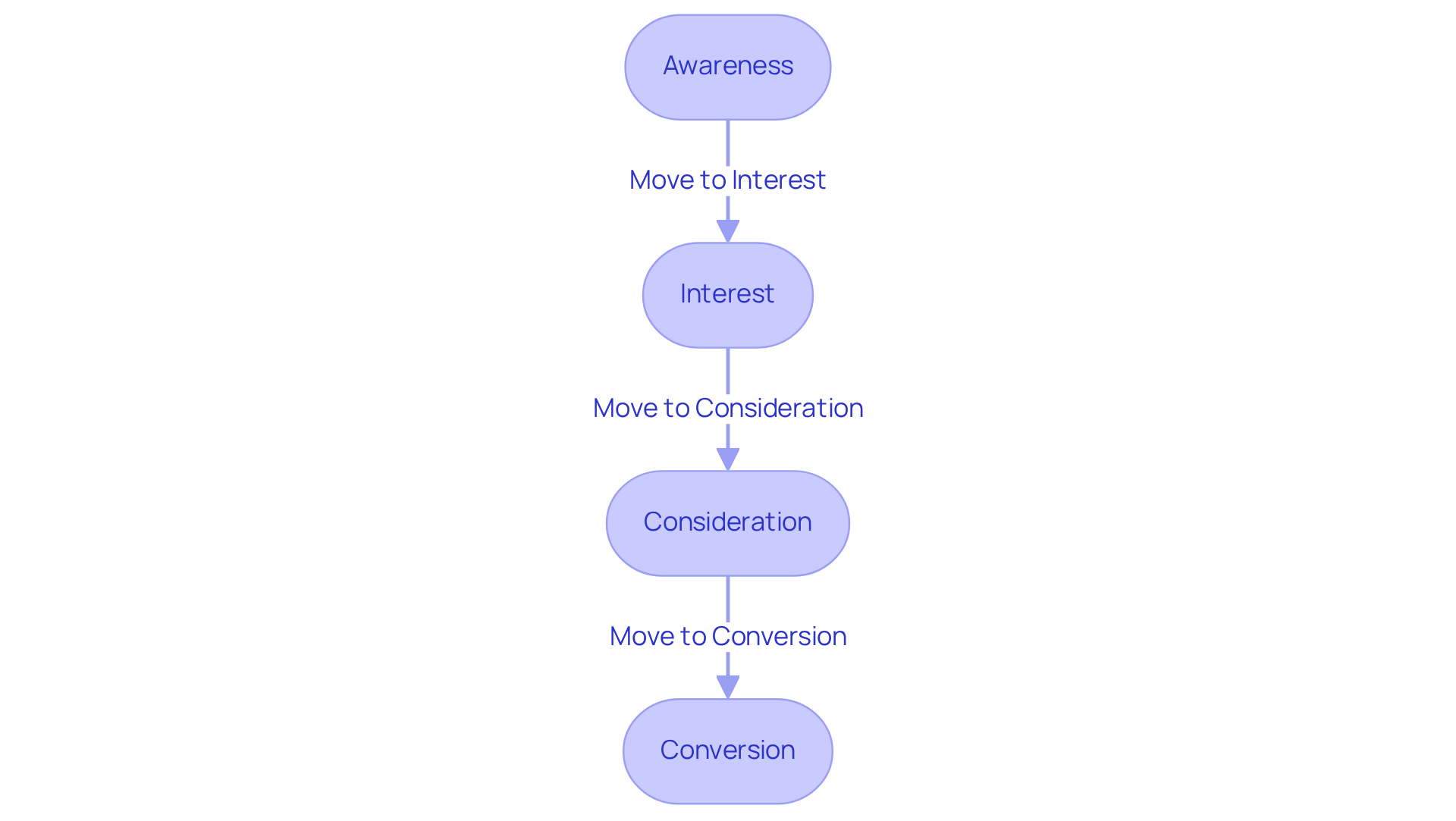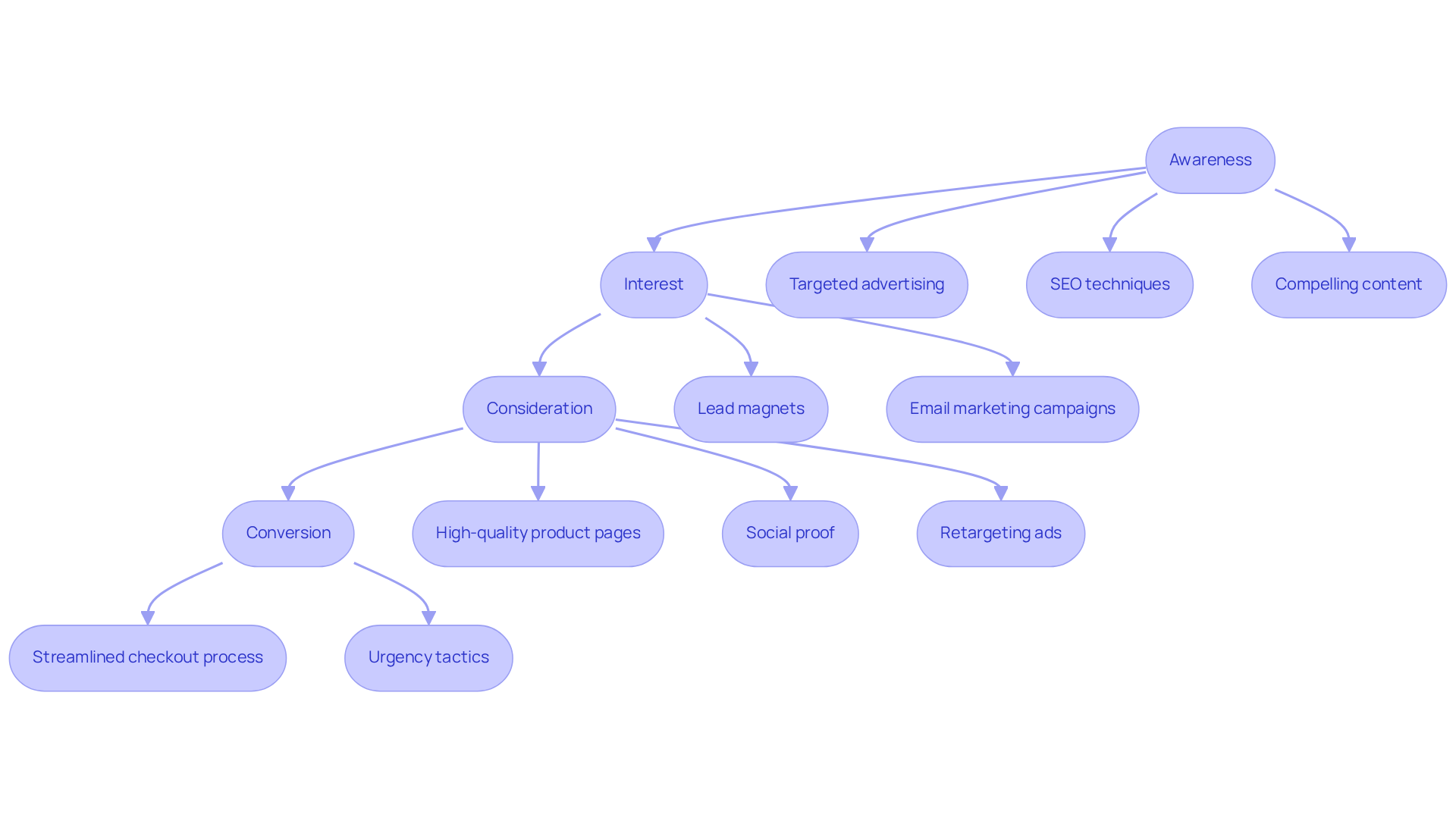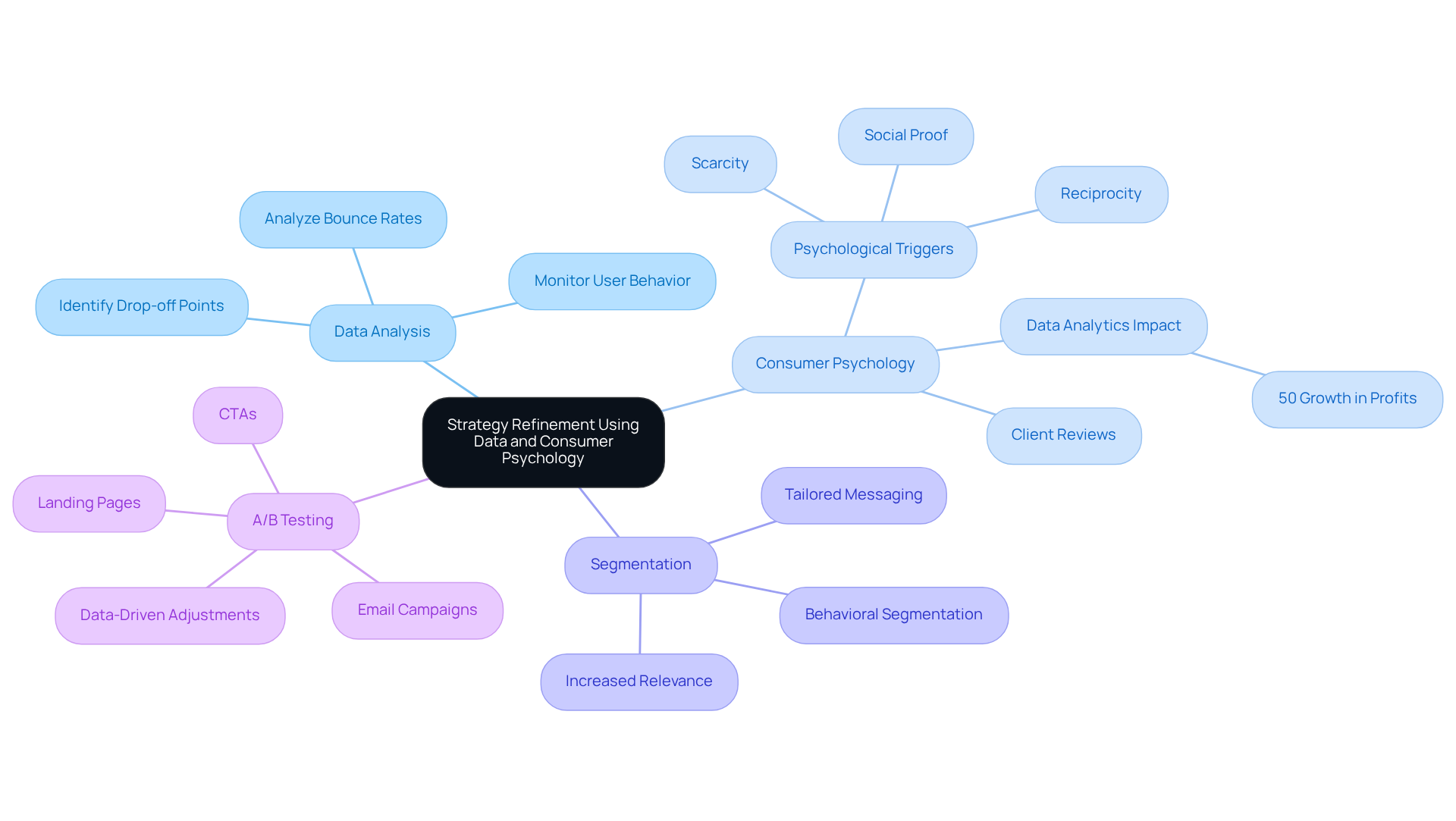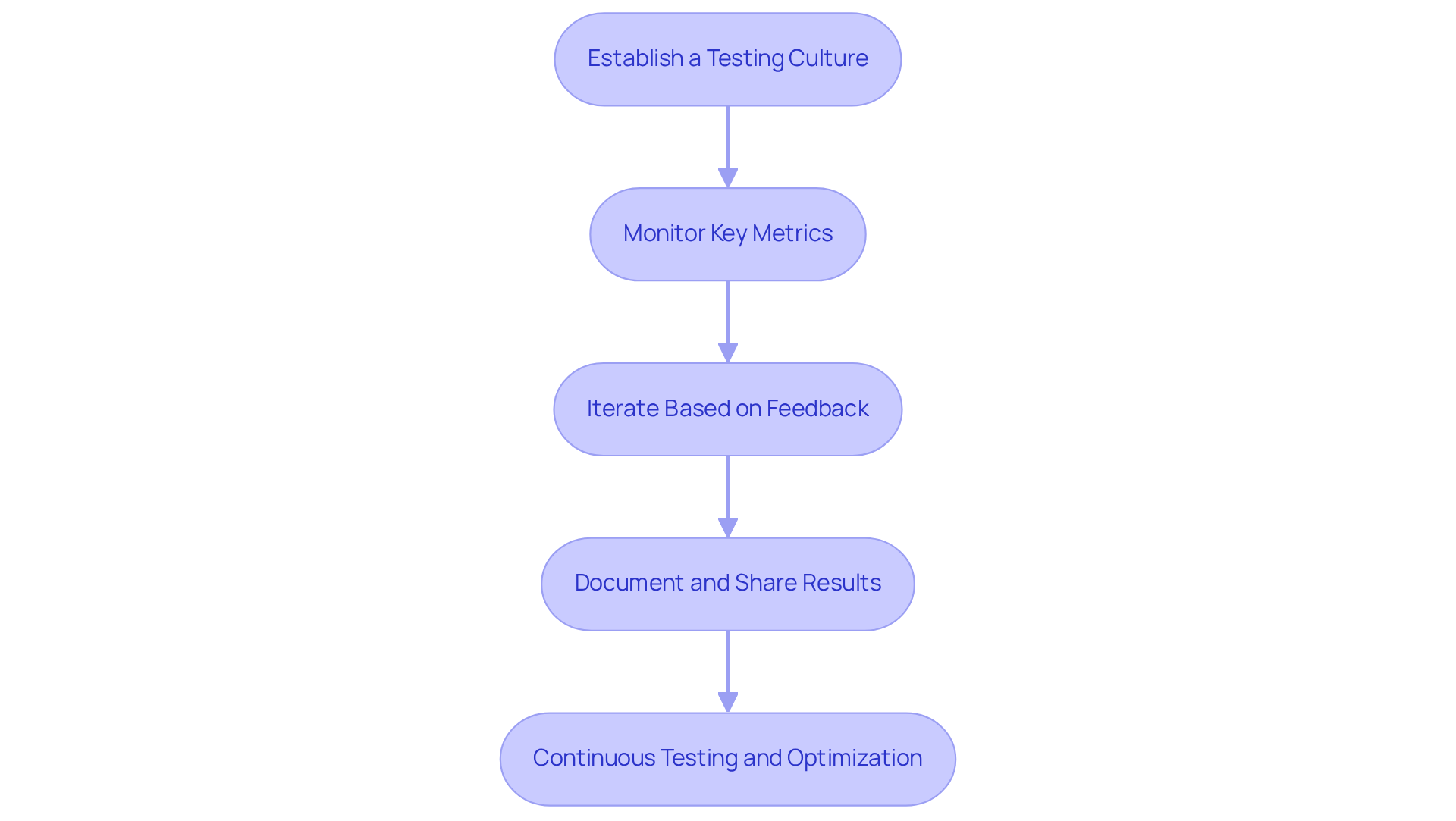
Overview
This article delves into the optimization of each stage of the marketing funnel, aiming to maximize conversions on funneling websites. It asserts the critical nature of tailored strategies across the stages—Awareness, Interest, Consideration, and Conversion. These strategies are underpinned by rigorous data analysis and insights from consumer psychology, effectively guiding potential customers through their journey. Ultimately, this approach enhances overall profitability, reinforcing the necessity for marketers to adopt a strategic mindset in their efforts.
Introduction
Understanding the intricacies of the marketing funnel is crucial for direct-to-consumer (DTC) brands determined to enhance their online presence and drive conversions. Each stage—Awareness, Interest, Consideration, and Conversion—presents unique opportunities for brands to engage potential customers and guide them toward making a purchase.
Yet, with an array of strategies at their disposal, how can companies ensure they are optimizing each stage effectively to maximize conversion rates? This article explores actionable techniques and insights that empower brands to navigate the complexities of funnel optimization, ultimately transforming leads into loyal customers.
Understand the Marketing Funnel Stages
The marketing funnel is a vital structure for DTC companies and plays an important role in their funneling website, comprising several essential stages: Awareness, Interest, Consideration, and Conversion. Understanding these stages enables companies to comprehend how with their products and adjust their approaches accordingly.
- Awareness: This initial stage is where potential customers first come across your identity. Effective strategies to enhance awareness include content marketing, social media engagement, and search engine optimization (SEO), which collectively attract traffic and generate interest.
- Interest: Once users recognize your company, they start to show curiosity in your products or services. To nurture this interest, brands should focus on creating engaging content, informative blog posts, and targeted advertisements that resonate with their audience.
- Consideration: In this stage, potential clients assess your offerings compared to those of competitors. Providing comprehensive product information, showcasing customer testimonials, and offering comparison guides can significantly influence their decision-making process.
- Conversion: The ultimate goal of the funnel is conversion, where users take the desired action, such as making a purchase. Enhancing the checkout process and utilizing persuasive calls-to-action (CTAs) are vital approaches to support this transition.
Grasping these stages is essential for DTC brands seeking to enhance their marketing strategies via a funneling website. For instance, data indicates that increasing customer retention by just 5% can boost profits by 25% to 95%, underscoring the importance of effectively guiding customers through the funnel. Furthermore, advanced AI users indicate 60% greater revenue growth compared to their counterparts, emphasizing the advantages of enhancing marketing approaches. By employing effective techniques on their funneling website, brands can greatly enhance their conversion rates and overall profitability. As Drew Medley notes, the modern digital marketing funnel creates a customer journey that feels intuitive, helpful, and almost too tailored to be true.

Optimize Each Stage of the Funnel for Conversions
To optimize each stage of the funnel effectively, consider the following strategies:
- Awareness: Leverage targeted advertising and robust SEO techniques to enhance visibility. Craft compelling content that resonates with your audience, drawing them into your narrative. Effective top-of-funnel (TOFU) strategies can significantly elevate brand awareness and expand your reach to new audiences via a funneling website.
- Interest: Employ lead magnets such as free trials, eBooks, or downloadable resources to capture leads. Implement email marketing campaigns that nurture these leads with personalized content, addressing their specific needs and concerns. This approach not only fosters trust but also increases the likelihood of a successful conversion.
- Consideration: Enrich your product pages with high-quality images, comprehensive descriptions, and authentic reviews from clients. Incorporating social proof at this stage enhances credibility and alleviates consumer doubts. Additionally, consider utilizing retargeting ads to remind users of products they previously viewed, keeping your offerings top-of-mind.
- Conversion: Streamline the by minimizing steps and offering multiple payment options to reduce friction. Implement urgency tactics, such as limited-time offers or exclusive discounts, to encourage immediate purchases. A well-optimized funneling website can significantly improve your overall conversion rates.
By focusing on these targeted enhancements, you can substantially increase the likelihood of transforming leads into loyal clients, thereby fostering sustainable growth for your direct-to-consumer (DTC) brand.

Leverage Data and Consumer Psychology for Strategy Refinement
To refine your strategies using data and consumer psychology, consider the following:
- Data Analysis: Leverage analytics tools to monitor user behavior on your website. Identify critical drop-off points in the funnel and analyze pages with high bounce rates to understand user disengagement. This foundational step is crucial for optimizing your marketing efforts.
- Consumer Psychology: Grasp psychological triggers such as scarcity, social proof, and reciprocity. For instance, showcasing client reviews can significantly enhance trust and drive conversions. Furthermore, integrating client data analytics can improve growth and profits by at least 50% (McKinsey), demonstrating the power of psychological insights in driving business success.
- Segmentation: Segment your audience based on behavior and preferences. Tailor your messaging and offers to different segments, thereby increasing relevance and engagement. This approach is essential as understanding customer sentiment becomes increasingly critical in competitive markets (Bernard Marr).
- A/B Testing: Regularly conduct A/B tests on landing pages, CTAs, and email campaigns to discover what resonates best with your audience. Utilize insights gained to make , ensuring your approaches align with evolving consumer psychology trends.
By integrating data analysis with consumer psychology, you can craft more effective marketing campaigns that resonate deeply with your audience, ultimately maximizing conversion rates. Parah Group's established methodologies have led to measurable enhancements, such as a 36% increase in ROI on ads, showcasing the effectiveness of these approaches.

Implement Continuous Testing and Optimization for Long-Term Success
To achieve sustained success through continuous testing and optimization, consider the following strategies:
- Establish a Testing Culture: Foster an environment where experimentation is encouraged. Regularly test new ideas and strategies on your funneling website to determine what resonates best with your audience. Organizations that have effectively established a testing culture have observed considerable enhancements in their success rates and overall performance.
- Monitor Key Metrics: Focus on essential key performance indicators (KPIs) such as conversion rates, average order values (AOV), and client acquisition costs. Companies that closely monitor these metrics can achieve up to a 36% increase in ROI on ads. These metrics should guide your testing initiatives and inform decision-making.
- Iterate Based on Feedback: Leverage customer feedback and data insights to refine your strategies. If a particular approach fails to deliver results, be prepared to pivot and explore alternative solutions. Continuous testing allows teams to identify bugs earlier in the software development process, minimizing business risks and enhancing product quality.
- Document and Share Results: Maintain a comprehensive record of your tests and their outcomes. Sharing these insights with your team not only fosters collaboration but also . This practice can lead to a more informed approach to future testing and optimization efforts.
By cultivating a culture of continuous testing and optimization, your brand can effectively adapt to market dynamics and consistently enhance conversion rates on a funneling website.

Conclusion
Understanding and optimizing the marketing funnel is not merely beneficial; it is essential for enhancing conversions on a funneling website. By recognizing the distinct stages of Awareness, Interest, Consideration, and Conversion, brands can tailor their strategies to effectively engage potential customers at every step of their journey. This structured approach not only improves user experience but also drives higher conversion rates, ultimately leading to increased profitability.
Key strategies include:
- Leveraging targeted advertising to boost awareness
- Utilizing lead magnets to maintain interest
- Enriching product pages for consideration
- Streamlining the checkout process for conversion
Furthermore, employing data analysis and consumer psychology can significantly refine marketing efforts, ensuring that messaging resonates with the audience and addresses their specific needs. Continuous testing and optimization empower brands to adapt to changing market dynamics and enhance their overall performance.
In conclusion, the significance of a well-optimized marketing funnel cannot be overstated. By implementing the outlined strategies and fostering a culture of continuous improvement, brands can navigate the complexities of consumer behavior and maximize their conversion potential. Embracing these practices will not only cultivate loyal customers but also secure sustainable growth in an increasingly competitive landscape.
Frequently Asked Questions
What is the marketing funnel and why is it important for DTC companies?
The marketing funnel is a vital structure for Direct-to-Consumer (DTC) companies that outlines the stages potential customers go through when engaging with products. It helps companies understand customer interactions and adjust their marketing strategies accordingly.
What are the main stages of the marketing funnel?
The main stages of the marketing funnel are Awareness, Interest, Consideration, and Conversion.
What happens in the Awareness stage of the marketing funnel?
In the Awareness stage, potential customers first encounter the company. Effective strategies to enhance awareness include content marketing, social media engagement, and search engine optimization (SEO).
How can companies nurture interest during the Interest stage?
Companies can nurture interest by creating engaging content, informative blog posts, and targeted advertisements that resonate with their audience.
What do potential clients evaluate during the Consideration stage?
During the Consideration stage, potential clients assess the company’s offerings compared to competitors. Providing comprehensive product information, customer testimonials, and comparison guides can influence their decision-making.
What is the goal of the Conversion stage in the marketing funnel?
The goal of the Conversion stage is to encourage users to take the desired action, such as making a purchase. Enhancing the checkout process and using persuasive calls-to-action (CTAs) are important strategies for this stage.
Why is understanding the marketing funnel important for DTC brands?
Understanding the marketing funnel is essential for DTC brands to enhance their marketing strategies, as it helps guide customers through the buying process and can significantly impact customer retention and profitability.
What is the potential impact of increasing customer retention by 5%?
Increasing customer retention by just 5% can boost profits by 25% to 95%, highlighting the importance of effectively guiding customers through the marketing funnel.
How does the use of advanced AI affect revenue growth for companies?
Advanced AI users experience 60% greater revenue growth compared to their counterparts, emphasizing the advantages of enhancing marketing approaches through technology.
What does Drew Medley suggest about the modern digital marketing funnel?
Drew Medley suggests that the modern digital marketing funnel creates a customer journey that feels intuitive, helpful, and highly tailored to individual needs.
FAQs











